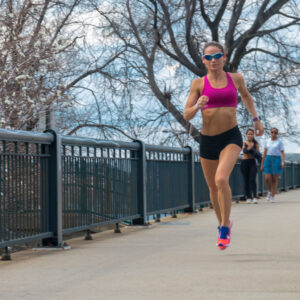 As athletes, we are constantly balancing load and capacity – the training for goals and the external factors. When the balance is off, injury risk rises, athletes burn out, and fitness tends to plateau. One of the priorities of the coach: keeping things in balance so that the athlete can achieve their goals. The challenge: some of the capacity will depend on personal scenarios to that runner. The coach and athlete have to be communicating so that the balance works.
As athletes, we are constantly balancing load and capacity – the training for goals and the external factors. When the balance is off, injury risk rises, athletes burn out, and fitness tends to plateau. One of the priorities of the coach: keeping things in balance so that the athlete can achieve their goals. The challenge: some of the capacity will depend on personal scenarios to that runner. The coach and athlete have to be communicating so that the balance works.
This is why (and I cannot stress this enough), using a cookie cutter plan online or bumming your friend’s training plan probably won’t serve you well, and can actually harm you. A coach is constantly adjusting things based on the feedback and communication from that athlete. This is also why it’s paramount you communicate with your coach – them seeing data without knowing how the workouts are feeling is only sharing part of the picture.
Here are things your coach (and you!) should be working on:
- Building mileage and fitness for the goal
- Consistency in training – locking in a plan
- Building strength and running economy
- Getting rest to allow for super-compensation
- Keeping injuries, aches and pains at bay
- Maintaining an element of fun
- Confidence and mental strength grow as fitness improves
- Educate athlete on training principals, fueling, pacing, etc.
Here are the possible challenges that will directly impact the above:
- Stress/anxiety in the personal life
- Poor sleep (less than 7 hours is proven to be where adaption will be compromised)
- Illness
- Poor nutrition (not getting enough calories or the right things)
- Lack of focus and commitment (could be caused by stress, a few bad workouts, and more)
This year, without in-person races but with a TON of added stress for the mass general public, perhaps this balance is harder than average to control.
While I hope your life hasn’t been seriously impacted by the pandemic, I think it’s safe to say all of our lives have been touched by now – losing a loved one, losing a job or reduced salary, change in lifestyle (social life, theater, sporting events, bars/restaurants), losing your training routine (maybe a gym, group fitness class, running group), losing all race goals, simply stressed due to the political climate – and if you’ve checked each one of those boxes, the odds are good your sleep sucks and you’re living through anxiety.
Running (and fitness in general) has been championed as a mood enhancer, stress reliever, and emotional outlet. But if you’re not sleeping, you may notice your fitness performance has been compromised. It’s a cyclical problem – you need sleep to run well, and running regulates sleep habits.
If you’re shaking your head that this is personally resonating, my advice is to take in a big inhale – and then a VERY big exhale. This reality isn’t normal. Sometimes just doing your best has to be enough. Let go of a speed or distance goal, and allow running to simply and purely be a source of joy. The external stresses as of late are well beyond anything we’ve navigated before, so don’t be so hard on yourself.
A coach is a good person to discuss these challenges with, and they may be able to restructure your calendar and expectations of the workouts. Right now, we need running more than ever. Though the role may need to change temporarily.
 After months of life as we know it changing in much of the country (and world), we’ve all in our own ways been adjusting to our new normal. Many aspects of our lives have been forced to change. It’s safe to say we all view this as temporary, but how temporary this will be is the million dollar question. Are we looking at weeks, months or years? Perhaps the worst thing right now is not knowing the end date. Today on my own run, I had a “come to Jesus moment” – if this “new normal” were to last for years versus months, how do I navigate my own life and assist in the lives of my clients? What habits and routines have I established since mid-March? Are they positive or negative? Are they sustainable for the long haul?
After months of life as we know it changing in much of the country (and world), we’ve all in our own ways been adjusting to our new normal. Many aspects of our lives have been forced to change. It’s safe to say we all view this as temporary, but how temporary this will be is the million dollar question. Are we looking at weeks, months or years? Perhaps the worst thing right now is not knowing the end date. Today on my own run, I had a “come to Jesus moment” – if this “new normal” were to last for years versus months, how do I navigate my own life and assist in the lives of my clients? What habits and routines have I established since mid-March? Are they positive or negative? Are they sustainable for the long haul?


